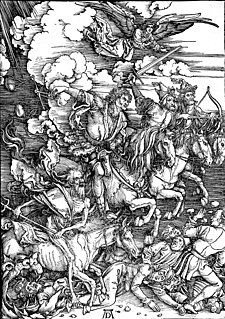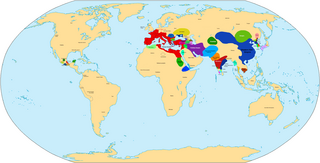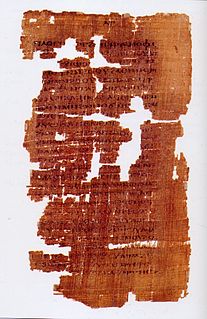Christian eschatology, a major branch of study within Christian theology, deals with "last things". Such eschatology – the word derives from two Greek roots meaning "last" (ἔσχατος) and "study" (-λογία) – involves the study of "end things", whether of the end of an individual life, of the end of the age, of the end of the world or of the nature of the Kingdom of God. Broadly speaking, Christian eschatology focuses on the ultimate destiny of individual souls and of the entire created order, based primarily upon biblical texts within the Old and New Testaments.

Eschatology is a part of theology concerned with the final events of history, or the ultimate destiny of humanity. This concept is commonly referred to as "the end of the world" or "end times".
Preterism, a Christian eschatological view, interprets some or all prophecies of the Bible as events which have already happened. This school of thought interprets the Book of Daniel as referring to events that happened from the 7th century BC until the first century AD, while seeing the prophecies of the Book of Revelation as events that happened in the first century AD. Preterism holds that Ancient Israel finds its continuation or fulfillment in the Christian church at the destruction of Jerusalem in AD 70.

AD 1 (I), 1 AD or 1 CE is the epoch year for the Anno Domini calendar era. It was the first year of the Common Era (CE), of the 1st millennium and of the 1st century. It was a common year starting on Saturday or Sunday, a common year starting on Saturday by the proleptic Julian calendar, and a common year starting on Monday by the proleptic Gregorian calendar. In its time, year 1 was known as the Year of the Consulship of Caesar and Paullus, named after Roman consuls Gaius Caesar and Lucius Aemilius Paullus, and less frequently, as year 754 AUC within the Roman Empire. The denomination "AD 1" for this year has been in consistent use since the mid-medieval period when the anno Domini (AD) calendar era became the prevalent method in Europe for naming years. It was the beginning of the Christian/Common era. The preceding year is 1 BC; there is no year 0 in this numbering scheme. The Anno Domini dating system was devised in AD 525 by Dionysius Exiguus.

Western Christianity is one of two sub-divisions of Christianity. Western Christianity is composed of the Latin Church and Protestantism, together with their offshoots such as Independent Catholicism and Restorationism.
Year 201 (CCI) was a common year starting on Thursday of the Julian calendar. At the time, it was known as the Year of the Consulship of Fabianus and Arrius. The denomination 201 for this year has been used since the early medieval period, when the Anno Domini calendar era became the prevalent method in Europe for naming years.

Year 337 (CCCXXXVII) was a common year starting on Saturday of the Julian calendar. At the time, it was known as the Year of the Consulship of Felicianus and Titianus. The denomination 337 for this year has been used since the early medieval period, when the Anno Domini calendar era became the prevalent method in Europe for naming years.

The Messiah in Judaism is a savior and liberator figure in Jewish eschatology, who is believed to be the future redeemer of the Jewish people. The concept of messianism originated in Judaism, and in the Hebrew Bible a messiah is a king or High Priest traditionally anointed with holy anointing oil. However, messiahs were not exclusively Jewish, as the Hebrew Bible refers to Cyrus the Great, king of Persia, as a messiah for his decree to rebuild the Jerusalem Temple.
Many Wikipedia articles on religious topics are not yet listed on this page. If you cannot find the topic you are interested in on this page, it still may already exist; you can try to find it using the "Search" box. If you find that it exists, you can edit this page to add a link to it.
In Christian eschatology, postmillennialism, or postmillenarianism, is an interpretation of chapter 20 of the Book of Revelation which sees Christ's second coming as occurring after the "Millennium", a Golden Age in which Christian ethics prosper. The term subsumes several similar views of the end times, and it stands in contrast to premillennialism and, to a lesser extent, amillennialism.
Premillennialism, in Christian eschatology, is the belief that Jesus will physically return to the Earth before the Millennium, a literal thousand-year golden age of peace. The doctrine is called "premillennialism" because it holds that Jesus's physical return to Earth will occur prior to the Millennium of peace. Premillennialism is based upon a literal interpretation of Revelation 20:1–6 in the New Testament, which describes Jesus's reign in a period of a thousand years.
The Irish calendar is the Gregorian calendar as it is in use in Ireland, but also incorporating Irish cultural festivals and views of the division of the seasons, presumably inherited from earlier Celtic calendar traditions.
Messianism is the belief in the advent of a messiah who acts as the savior or liberator of a group of people. Messianism originated as an Abrahamic religious belief, but other religions have messianism-related concepts. Religions with a messiah concept include Zoroastrianism (Saoshyant), Judaism, Buddhism (Maitreya), Hinduism (Kalki), Taoism, and Bábism.

Amillenarism or Amillennialism is a type of chillegorism which teaches that there will be no millennial reign of the righteous on earth. Amillennarists interpret the thousand years symbolically to refer either to a temporary bliss of souls in heaven before the general resurrection, or to the infinite bliss of the righteous after the general resurrection.

Written in Syriac in the late seventh century, the Apocalypse of Pseudo-Methodius shaped and influenced Christian eschatological thinking in the Middle Ages. Falsely attributed to Methodius of Olympus, a fourth century Church Father, the work attempts to make sense of the Islamic conquest of the Near East. The Apocalypse is noted for incorporating numerous aspects of Christian eschatology such as the invasion of Gog and Magog, the rise of the Antichrist, and the tribulations that precede the end of the world.
In Abrahamic religions, the Messianic Age is the future period of time on Earth in which the messiah will reign and bring universal peace and brotherhood, without any evil. Many believe that there will be such an age; some refer to it as the consummate "kingdom of God" or the "world to come".

Analogies have been drawn between Buddhism and Christianity, and Buddhism may have influenced Christianity. Buddhist missionaries were sent by Emperor Ashoka of India to Syria, Egypt and Greece beginning in 250 BCE and may have helped prepare for the ethics of Christ. Others have noted the significant differences between the two religions beginning with monotheism's place at the core of Christianity, and Buddhism's orientation towards non-theism which runs counter to teachings about God in Christianity; and extending to the importance of grace in Christianity against the rejection of interference with karma in Theravada Buddhism, etc.

The Byzantine calendar, also called "Creation Era of Constantinople" or "Era of the World", was the calendar used by the Eastern Orthodox Church from c. 691 to 1728 in the Ecumenical Patriarchate. It was also the official calendar of the Byzantine Empire from 988 to 1453 and of Kievan Rus' and Russia from c. 988 to 1700, as well as being used in other areas of the Byzantine commonwealth such as in Serbia. Since Byzantine is a historiographical term, the original name uses the adjective "Roman" as it was what the Eastern Roman Empire continued calling itself.

The four kingdoms of Daniel are four kingdoms which, according to the Book of Daniel, precede the "end-times" and the "Kingdom of God".

Since the arrival of Christian missionaries in India in the 10th century(traits of Christians in kerala from 1st century, Saint Thomas Christians ), followed by the arrival of Buddhism in Western Europe in the 4th and 5th centuries, similarities have been perceived between the practices of Buddhism and Christianity. During the 20th century, the differences between these two belief systems were also highlighted.










